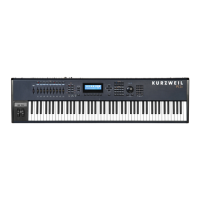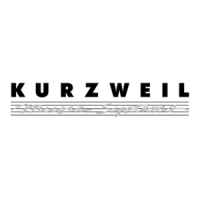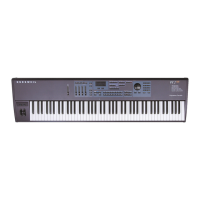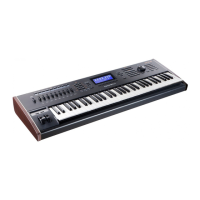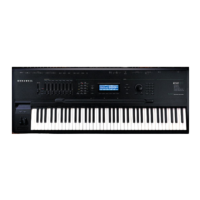Program Edit Mode
FX Page
3-5
FX Resources and DSP FX Units
e PC4 SE has 32 “units” of DSP (digital signal processing) eects resources that can be
used to load eects chains. Each FX chain requires a certain number of FX units in order to
load, depending on its complexity.
e top line of the display shows a fraction with the number of units used by the selected
channel, over the total number of units used. When attempting to use more than 32 units of
FX resources at once, some FX Chains will not be loaded.
When sustaining notes while switching between 2 Programs, FX resources from the rst
Program may be “stolen” in order to load eects from the second Program. Because of this,
you may hear a change in the sound of the rst Program when switching to the second
Program. If both Programs each use 14 FX Units or less, then in most cases FX resources will
not be stolen from the rst Program, and you should not hear a change in the sound of the
rst Program.
Insert
Choose an eects Chain that will be applied to the current program. If you only need to use
one Chain at a time on one MIDI channel, Insert eects may be all you need. If you plan
to use multiple programs on dierent MIDI channels, it is best to use both Insert and Aux
eects (see Aux below). Aux eects have the advantage of being available to all programs on
each MIDI channel at the same time.
Aux 1, Aux 2
Choose an eects Chain for each of the two auxiliary audio buses. An aux bus is an audio
channel with a shared eects Chain that can be used by programs on any of the 16 MIDI
channels. e aux eect is useful when you want to use the same type of eect for multiple
channels (typically used for Reverb or Delay). You apply an aux eect to the program on a
MIDI channel by “sending” the audio from that channel to an aux bus.
Every channel is connected to the aux buses, but the aux buses don’t receive the signal until
you turn up the aux “send” level for that channel, which controls a channel’s input level to
the aux bus. On each MIDI channel you can control the aux send level for that channel’s
program, in turn controlling how loudly you can hear the aux eect applied to that channel’s
program. e aux send level is set by the Aux 1 and Aux 2 Send parameters on the FX page.
Many Chains also have an additional Aux send, Wet/Dry, or Amount parameter that will
appear on the Parameters page. For Reverb and Delay Chains, send parameters are often
assigned by default to Slider 4 or Slider 5 respectively.
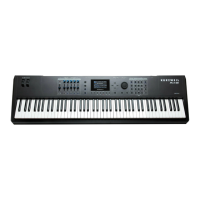
